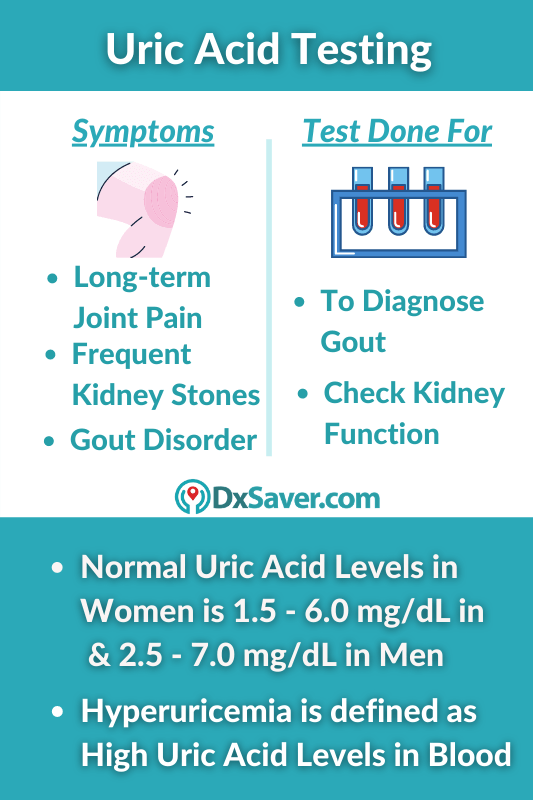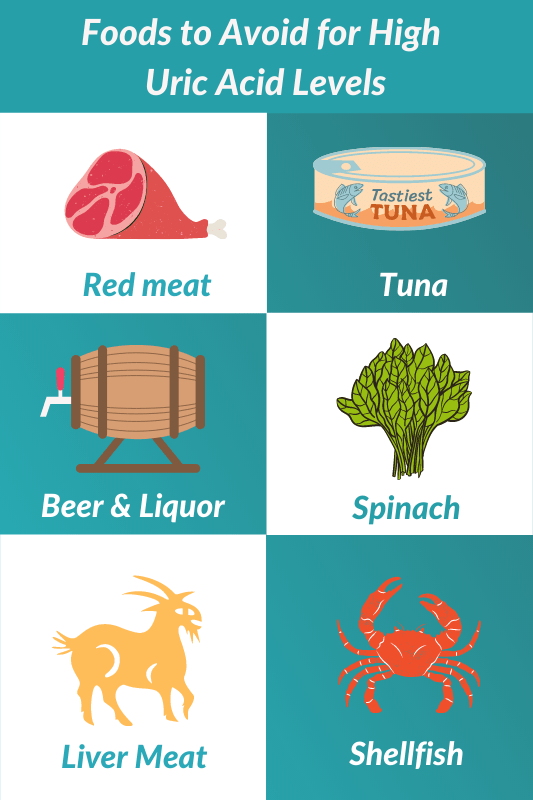
A uric acid test is done to measure the uric acid in your blood or urine. Uric acid is a usual waste product broken down by your body called purines. When your body cannot excrete enough uric acid due to kidney malfunction or other dietary reasons, your uric acid levels tend to elevate and may lead to severe health complications.
The following article explains all the significant topics asked on uric acid, including why is the uric acid test done, procedure and preparations for the uric acid test, uric acid test normal levels, and what does high/low uric acid levels mean, and more.
- Uric Acid Blood Test Cost
- What is Uric Acid in Blood Test?
- What is Uric Acid & Why is it Important?
- How is the Uric Acid Blood test performed?
- Is there any Preparation Required before the Test?
- Are there any risks in the Uric Acid test?
- What does the Uric Acid Test Result Mean?
- Uric Acid Blood test high
- Uric Acid blood test low
- Providers Locations
For our readers, who are very much interested in knowing the Uric Acid Blood test cost beforehand, we would like to begin with that section.
Uric Acid Blood Test Cost
The cost of the Uric Acid test ranges between $39 and $47 in different labs and facilities across the U.S. No prior appointment is required. Compare the price, order your test online and visit the nearest lab during lab business hours. Complete the procedure and get the results in your email in 2 to 3 business days. Doctor consultation is also available for further treatment or for any kind of medical advice.
The following table shows the Uric Acid blood test cost at two of our partner laboratories (CLIA – Certified) network located across the U.S.
Name of our Partner Labs | Book Online |
HealthLabs
| Offer Price$39 |
Personal Testing Labs
| Offer Price$47 |
Cost of Uric Acid test cost with insurance
Many health insurance policies in the U.S. cover the cost of the Uric Acid test when it is done once or twice a year. Also, the coverage offered by private health insurance policies and national health insurance programs varies widely. So we recommend you to check with your insurance company.
Our Uric Acid testing providers do not accept any health insurance. But, on request, they can provide you with a receipt containing all the details like the name and code of the test, and CPT code which is necessary for insurance reimbursement purposes.
What is Uric Acid in Blood Test?
Uric acid is a waste product made from a result of breaking down purines (a chemical component of your DNA and RNA, uric acid is a waste product of purines.). Typically, this acid dissolves in blood and then goes to the kidneys and must be eliminated by your body through urine or your gastrointestinal tract. The uric acids.
If your uric acid is produced at a high level or at a level which your kidneys cannot filter out enough, you can become sick. One of such medical conditions where high uric is found is called Hyperuricemia. Hyperuricemia can occur due to health conditions such as kidney disease, certain blood cancers, genetic errors of metabolism, hypothyroidism, psoriasis, rhabdomyolysis, hemolytic anemia, certain medications, and a diet rich in purines.
Purines and uric acid are found in some high-protein diets and some drinks:
- Anchovies, Sardines, Mackerel, Herring
- Beer
- Dried beans/peas
- Organ meats; Liver, Kidney
- Mussels
- Yeast
Another major condition where high uric causing health issues is Gout. This high uric acid can make crystals that form in your joints resulting in a form of arthritis. It can cause joint pains and painful inflammations around the joints.
What is Uric Acid & Why is it Important?
This test measures the levels of uric acid in your body. This test is useful in the diagnosis and treatment of gout, renal failure, and a variety of other disorders including psoriasis, starvation, and other wasting conditions.
Most commonly the Uric Acid Test is done for
- Help diagnose gout, a type of arthritis.
- Monitor people who are undergoing radiation treatment/chemotherapy
- Check kidney function after an injury
- Evaluate people with kidney stones, because excess uric acid can contribute to kidney stones.
Symptoms and signs of high uric acid levels/You may need a uric acid test if:
- You have severe or long-term joint pain or a condition related to gout
- You’re currently undergoing chemotherapy
- Going to start chemotherapy
- You have frequent kidney stones
- You’ve been diagnosed with gout in the past

How is the Uric Acid Blood test performed?
As the name suggests, the Uric Acid Blood test is a simple blood test. During this test, a lab technician or a phlebotomist will cleanse the skin with an antiseptic and place an elastic band around the upper arm so that the vein becomes visible and swells with blood. He/she then injects a needle and draws a sample of blood in a test tube. After the blood is drawn, he covers the injected area with a band-aid to stop bleeding. The typical blood specimen is then sent to the lab for analysis.
It takes less than 10 minutes to perform this test.
Is there any preparation required before the test?
For the Uric Acid test, you’ll be asked to fast for at least 4 hours before giving your specimen at the lab. Also, the following can interfere with your test results, hence it is advisable to avoid the following before taking a uric acid test.
- Alcohol
- Certain medications, such as aspirin and ibuprofen
- High levels of vitamin C/vitamin C supplements
- Have taken dyes (used in X-ray tests)
Other than this, there is no special preparation required for the Uric Acid Blood test, you can continue with your regular activities and other diets.
Are there any risks in the Uric Acid Blood test?
There is no possible risk or complication in taking the Uric Acid blood test. You might have slight pain or bruise in the injected area for a very little period.
What does the Uric Acid Test Result Mean?
Uric acid levels help in determining the cause of certain medical conditions and to determine what treatments are appropriate. In some cases, you may not need any treatment, some diet adjustments can help in recover uric acid normal levels. Low uric acid levels are not generally common.
Uric Acid test normal range
Normal levels of uric acid vary according to gender and age. According to the American College of Rheumatology (ACR) normal uric acid levels ranges between 1.5 to 6.0 milligrams/deciliter (mg/dL) in women and 2.5 to 7.0 mg/dL for men. If you have joint issues (gout related conditions) your uric acid levels should be lower than 6.0 mg/dL.
Uric Acid Blood test high
If your uric acid test levels show more than 7.0 mg/dL if you’re a man and 6.0 mg/dL if you’re a woman, then you likely have any of the following conditions –
- A diet that includes too many purine-rich foods
- Alcoholism
- Kidney disease
- Preeclampsia, a condition that can cause dangerously high blood pressure in pregnant women
- Side effects of cancer treatment
Hyperuricemia is defined as a blood uric acid level greater than 6.0 mg/dL in women and greater than 7.0 mg/dL in men.

How to lower high uric acid levels?
High uric acid levels can be lowered by adjusting some food habits. Following are some foods that are rich in purines which causes high uric acid levels. By avoiding the following or limiting them, you can lower the uric acid levels –
- Shellfish
- Red meat
- Organ meat, such as liver
- Beer and liquor
- Spinach, cauliflower & mushroom
Sometimes, your doctor may recommend following other tests to have a complete picture of why your uric acid levels are high and treatment will be prescribed according to your condition, symptoms, and knowing the underlying cause of your high uric acid.
- Complete blood count (CBC)
- Complete metabolic panel
- Lipid profile
- Joint X-rays (to assess joint swelling)
- Joint aspiration (to look for uric acid crystals in the joint)
- Renal ultrasound (if kidney stones from uric acid are suspected)
Uric Acid blood test low
Low uric acid levels are not very common. However, the following are some conditions that incident if your uric acid levels are lower than normal –
- Wilson’s disease, which is an inherited disorder that causes copper to build up in your body tissues
- Fanconi syndrome, which is a kidney disorder most commonly caused by cystinosis
- Alcoholism
- Kidney or liver disease
- A diet low in purines
Providers Locations
The Uric Acid test can be done in any of the following locations across the U.S. by visiting the nearest lab. To know the Uric Acid test cost, refer to the first section of the article.
- Alabama
- Arizona
- Arkansas
- California
- Colorado
- Connecticut
- Delaware
- Florida
- Hawaii
- Georgia
- Idaho
- Illinois
- Indiana
- Iowa
- Kansas
- Kentucky
- Louisiana
- Maine
- Michigan
- Minnesota
- Mississippi
- Missouri
- Montana
- Nebraska
- Nevada
- New Hampshire
- New Mexico
- North Carolina
- North Dakota
- Oklahoma
- Oregon
- Pennsylvania
- Puerto Rico
- South Carolina
- South Dakota
- Tennessee
- Texas
- Utah
- Vermont
- Virginia
- Washington
- West Virginia
- Wisconsin
- Wyoming
Frequently Asked Questions
Will insurance cover my testing cost?
No, insurance will not be covered in the billing. However, they will provide you a receipt for insurance reimbursement purposes.
How should I book my appointment?
You can choose the most suitable provider from above and make an appointment by following the instructions mentioned by them.
Can I cancel my lab test order?
Yes, you can cancel your lab test order anytime before your testing. A refund will be initiated after deducting the cancellation fee. However, cancellation is at the discretion of the provider.
Do the providers offer result interpretations?
Yes, a few providers may provide doctor consultation who will take you through the results and provide clarification if needed.
How do I receive my report?
To ensure your privacy, the test report will be mailed to you by the provider.
Other topics you may be interested in:-
- What is MCH in a blood test?
- MCHC normal levels in the blood and high/low levels causes
- H Pylori blood test cost
- Is Itching a Symptom of STD?
- D-dimer test cost in the US
- Heavy Metal poisoning symptoms, types & diagnosis
- What is the Myoglobin blood test & why is it important?
- PTT Blood test cost in the US
- Normal iron levels and what do the high/low levels interpret?
- What are the symptoms of male infertility?
- Stages of colon cancer and its symptoms
- Tay-Sachs Disease symptoms and how common is it?
- Types of STDs That Cause Skin Rashes on Genitals and Body
- Herpes Vs. HPV: Differences, Symptoms, and Testing Cost






